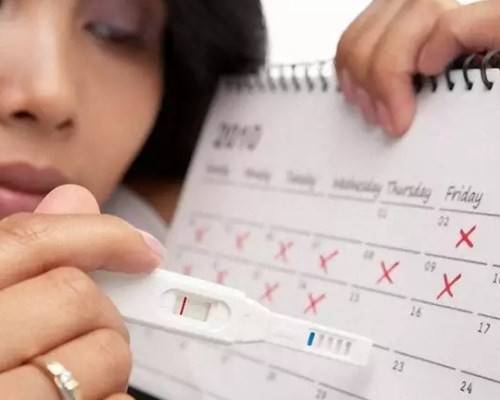Breastfeeding is the most important condition for the healthy growth and development of the baby. Mother's breast milk is considered the best nutrition for a newborn. Its rich composition provides the child with everything he needs. It is especially worth noting the presence of immunoglobulins, which are responsible for protecting the body from various infections.
During pregnancy, a woman manages to forget what menstruation is. A specific hormonal background ensures its complete absence. But even after childbirth, cyclic bleeding does not rush to come every month. While a woman is breastfeeding on demand, progesterone and especially prolactin suppress ovulation, making another pregnancy impossible. Menstruation may be absent for up to six months or more, and the cycle itself is restored gradually and intermittently.
A delay in menstruation during breastfeeding is normal, but a new pregnancy cannot be ruled out.
Menstrual cycle
The usual frequency of menstruation is on average one month. However, the duration of the cycle can be either 20 or 35-40 days. These are all the individual characteristics of each woman. After childbirth, the resumption of menstruation varies. Breastfeeding does not always guarantee against the start of a new cycle.
Phases of the menstrual cycle:
- Follicular. The beginning of each cycle occurs on the first day of bleeding. At this time, the level of progesterone drops sharply and the process of rejection of the loose layer of endometrium lining the inner surface of the uterus begins. The usual duration of the first phase is approximately 5 days.
- Ovulatory. In the next stage, estrogen levels gradually increase and reach their maximum two weeks after the onset of menstruation. At this point, the egg matures in the ovary, and it exits into the cavity of the fallopian tube.
- Secretory. An egg can spend about two days waiting for a sperm. Progesterone secretion reaches its maximum. If fertilization does not occur, she dies. Gradually, the level of progesterone drops, and the endometrium, which was preparing to receive a fertilized egg, begins to be rejected.
If a woman has a delay in her period while breastfeeding, regardless of her desire for pregnancy, you can use not only the test, but also measuring the basal temperature in the rectum. The measurement should be taken in the morning, without getting out of bed. Indicators above 37 degrees are a serious reason to visit a gynecologist. In the absence of pregnancy, the temperature decreases significantly by the end of the cycle. And after conception it remains at a high level until childbirth. This method will also help to find out why there are no periods while breastfeeding.
Chest pain and no periods: physiological reasons
A delay of menstruation by 2–3 days is not considered a problem in gynecology, since a woman’s body cannot work with the precision of a clockwork mechanism. The norm is also a slight deviation from the cycle, which appears due to climate change, physical activity, stress, etc., if it happens no more than 1-2 times a year.

First signs of pregnancy
Delayed menstruation is one of the first signs of pregnancy. If you still haven’t gotten your period within 7-10 days after the usual onset of your period, you should do a test.
A woman needs to pay attention to other symptoms of possible conception: breast tenderness, nipple sensitivity, abdominal pain, frequent urination
Breast pain provokes a hormonal surge. With successful conception, the production of estrogen, which is responsible for the formation of the placenta, increases, as well as progesterone and prolactin, which are needed to prepare the glands for lactation and feeding the baby.
Physical activity, stress, climate change
Under the influence of stress or excessive physical exertion, the functionality of the cells of the hypothalamus and pituitary gland is temporarily disrupted, as a result of which the cyclical synthesis of estrogen and progesterone is disrupted. Due to an imbalance of hormones, the mammary glands are under the influence of estrogen alone for a long time - women notice that there is no menstruation, and their breasts are swollen and sore. The delay may last 4–10 days.
Climate change will not have a positive effect on health either - while the body adapts to unusual conditions, there will be no menstruation. Acclimatization can take a long time, even several weeks.
Taking hormonal contraceptives
Breast tenderness while taking birth control pills is normal if it occurs in the first 3 months of using them. The symptom is a consequence of the high estrogen content in the medication and the functional immaturity of the uterine mucosa. The body will get used to the dosage of the hormone, and the pain will stop bothering you. If it persists, perhaps the drug was chosen incorrectly - you need to consult a doctor.
Soreness of the mammary glands is not uncommon after discontinuation of OCs. Many women also note that they do not have their periods on time or that they started earlier. The cycle is restored within 3–4 months. A similar situation is observed with the abuse of emergency contraception. Their use more than twice a year threatens to disrupt the endocrine system.

Menopause period
Menstrual irregularities after 40 years are quite common. During perimenopause, a woman experiences breast pain and increased nipple sensitivity due to changing hormone levels. At the same time, ovarian function decreases, which explains the delay in menstruation.
Menopause occurs between the ages of 45 and 55, when a woman experiences a decline in the production and release of reproductive hormones into the blood. Due to the lack of cyclical changes, the effect of estrogen alone on the body, as well as stopping the processes of maturation and rejection of the endometrium, a woman’s breasts hurt and swell.
Postpartum period
If a young mother is determined to breastfeed her newborn baby for a long time, the absence of menstruation is an absolutely natural phenomenon. Immediately after birth, prolactin levels begin to increase even more, so that after 3-4 days the first milk appears. The more time a newborn spends at the breast, the more the secretion of this hormone increases. For how much milk a mother will have in the future, the first week after birth is of considerable importance.
Many women who have problems conceiving are found to have high levels of prolactin after examination. It is for this reason that they fail to get pregnant, since the increased secretion of this hormone ensures the complete absence of ovulation. However, no lactation is observed.
For the same reason, the first menstrual cycle of a nursing mother is postponed indefinitely. The body of a woman who has recently given birth produces another important hormone - oxytocin. Its main effect is that at a high level, the breast itself ensures the free release of milk without additional stimulation. Therefore, any nursing mother has to use special breast pads during lactation . At first, milk often spontaneously flows out of the breast.
Should you sound the alarm if your period is late?
Doctors explain that the method of delivery (natural birth or the birth of a baby using surgical intervention) does not affect the timing of the resumption of the menstrual cycle, provided the baby is breastfed. Those. a young mother who gave birth to a child by cesarean section, who puts the baby to the breast on demand, does not skip night feedings, introduces complementary foods no earlier than six months and continues breastfeeding can count on the resumption of the menstrual cycle eight to twelve months after birth.
One should not rule out the possibility that menstruation will begin one and a half to two years after the arrival of a little person in the family. This is also a variant of the normal process of restoring reproductive function.
The method of delivery does not in any way affect the timing of the resumption of menstruation. However, after surgery, the body needs more time to recover, so a young mother is recommended to visit an obstetrician-gynecologist two to three months after giving birth, six months and a year. The doctor will conduct an examination, do an ultrasound to assess the condition of the uterine scar and take the necessary tests. These are necessary examinations to exclude inflammatory and other pathological processes in a woman’s reproductive organs.

Only a doctor can answer all the young mother’s questions and conduct a comprehensive examination, if necessary.
After surgical delivery, the process of complete restoration of the functions of the reproductive system is influenced by the type of feeding of the child:
- when establishing lactation immediately after childbirth, while still in the maternity hospital, and continuing breastfeeding on demand constantly, menstruation may appear over a long period of time: from several months to one or two years;
Based on reviews from mothers who gave birth to children via cesarean section, for many, the first menstruation after childbirth begins from the moment complementary foods are introduced to the baby.
- if the child is fed both breast milk and a special adapted formula, the mother observes the onset of menstruation three to four months after the woman is discharged from the hospital;
- in the case when the mother is unable to breastfeed the baby or does not want to do so, i.e. the lactation process does not start, the menstrual cycle can be restored six to eight weeks after birth. The thing is that the body does not produce prolactin, so nothing slows down the work of the ovaries. The cycle resumes immediately, the egg matures and ovulates, and the reproductive function begins its work.
Doctors warn that if your period does not come eight to twelve weeks after discharge from the maternity hospital, you should urgently seek advice from a women's doctor.
Unplanned pregnancy
Often, especially after the first pregnancy, young mothers are not against having another baby. At first, mom will have a hard time. However, after some time, the children will begin to play together, and it will be much easier for the young mother to cope with childcare.
Unfortunately, living conditions or family income in terms of finances do not always allow raising many children. In this case, an unplanned pregnancy can greatly upset the young mother. Some choose abortion and do not regret it at all. Others will have to spend a lot of time crying about their unborn baby.

The absence of menstruation while breastfeeding is not a reason to relax. Over time, lactation becomes more and more stable, prolactin levels gradually decrease, and egg maturation can occur at any time.
Modern medicine can offer many reliable methods of protection, especially monocomponent drugs and medical coils.
When pregnancy occurs, a symptom such as breast enlargement and unusual tenderness to the touch appears. This is also caused by a sharp change in hormonal levels. If such symptoms appear, you should immediately undergo an ultrasound procedure and consult a gynecologist.
Reasons and timing of delayed menstruation: from 2 days to a month
Menstruation is an integral biological process in the life of every woman. Of course, almost all girls already know from the age of 10-12 that menstruation is a period in the life of every girl and woman during which blood is released from the vagina.
Let’s say right away that there is a certain norm for delaying menstruation. What it is? This is a certain number of days of delay that you shouldn’t worry about. In simple terms, a delay of menstruation for 2-7 days, in principle, does not bode well. This, of course, does not mean that such a situation can be ignored, but there is no need to panic ahead of time either.
- So, if “these days” are delayed by 2-3 days, then your first actions should be aimed at excluding or confirming pregnancy. Perhaps the most common cause of delays is the onset of pregnancy, so no one needs to be told exactly how to check for its presence or absence.
- For those who have not previously encountered such a situation, you need to buy a pregnancy test and do it in accordance with the instructions. It is recommended to buy the test at a pharmacy. If the test excludes a possible pregnancy, then, in principle, it is too early to worry. Of course, every girl in such a situation will think about what could be the reason for the absence of menstruation. It is in this case that the possible cause may be illnesses suffered during the month, stress, climate change (vacation at sea, in another country), and heavy physical activity.

- If 3 to 7 days have passed since your period should have started, then there are more reasons for concern, but there is absolutely no need to panic. Firstly, you must do the test again, because there are cases when in the first days of the delay the test does not detect pregnancy. Secondly, you need to pull yourself together and not aggravate your condition with stress and nerves. If you no longer have the strength to wait for the “days” to come, then you should go to the doctor. It is also necessary to go to a gynecologist if the delay is accompanied by uncharacteristic or acute pain.
- If more than a week has passed, and menstruation has not pleased you with its arrival, we advise you to contact a specialist who, after carrying out all the necessary actions (examination, tests, ultrasound), will be able to tell you what is the reason for the absence of menstruation.
Generally speaking, possible reasons for missing periods may include:
- Presence of pregnancy.
- Reorganization of the body. This process is not a secret, perhaps, for any woman. Restructuring of the body can occur several times a year or be absent altogether. For example, for many women this period falls during the transition from winter to spring.
- Various diseases of the reproductive system. Here you have inflammation of the ovaries, uterus, and possible cysts, etc.

Infections, both genital and viral. We will not go into details here. Also, the cause may be hormonal imbalance, by the way, this reason should be treated for a long time and carefully. We should not exclude other causes that are not related to gynecological diseases.
This may be excessive fasting, improper diets, underweight or excess weight, or taking medications.
Once again, we draw your attention to the fact that in the absence of pregnancy, chronic diseases of the reproductive system, especially heavy physical activity, and maintaining a normal daily routine, a delay of up to 1 week is considered quite normal.
There is no need to diagnose yourself ahead of time, much less engage in any self-medication. If you are a particularly suspicious and restless person, it is better to immediately consult a doctor, he will definitely explain to you the reason for the absence of menstruation.
Dates for the appearance of the first menstruation
When the first menstruation appears, a young mother should pay special attention to her well-being. In case of unwanted pregnancy, all precautions must be taken. Soon after giving birth, it is advisable to visit your gynecologist and choose a method of contraception.
Usually the first menstrual cycle is characterized by unusual pain. It is acceptable to take medications approved during lactation to relieve pain. With fairly modest amounts of discharge before pregnancy, significant changes can occur after childbirth. Often the first menstruation is especially heavy.

Causes
It is worth considering what are the reasons why, after a positive result of a blood test, the test may continue to show one line. First of all, you need to understand that the tests are not 100% reliable, and do not even “reach” the 99% declared by the manufacturer for advertising purposes on the packaging
The fair chance of getting an erroneous result is about 5%, and this cannot be ignored. And also don’t discount the possibility that ovulation occurred later
In this case, implantation was later than expected.
The hormone primarily grows in the blood plasma, which can be determined by laboratory diagnostics, and in the urine the concentration of the hormone increases much later, so tests after a positive blood test may remain negative. But it won't always be like this. Gradually, the concentrations of hCG in urine will become higher, which is easy to check by simply repeating the test after 2-4 days.
Sometimes women get strange results - a negative line after a positive test, or this result after a positive blood test. What could this mean? About two possible complications of pregnancy - frozen or ectopic pregnancy. In the first case, the embryo, after implantation, for some reason stops developing and dies; the level of hCG in this case begins to decrease, as evidenced by a negative result after a positive one. In the second case, the hCG level increases very slowly, unevenly, and the test either remains negative for a long time or becomes weakly positive. The second strip, which is clearly inferior in brightness and clarity to the first, is in no hurry to become brighter.

Another reason why a test may remain negative during pregnancy is errors during the test.
In the early stages, it is very important to follow all the rules of the instructions and not neglect them in order to determine pregnancy as accurately as possible
Amenorrhea after first menstruation
Problems can arise both before and after the arrival of the first menstruation.
Sometimes women, after several regular cycles, experience the disappearance of menstruation during breastfeeding. Such manifestations do not always indicate pregnancy; often it is a hormonal imbalance that leads to such consequences.
Normally, every woman’s menstrual cycle has a certain periodicity. However, you can meet young mothers whose periods have already come and disappeared. There can be many reasons for this:
- hormonal imbalance;
- unplanned pregnancy;
- decreased frequency of breastfeeding.
What is hormonal imbalance?
The human body is not always able to work as a single, well-functioning system. Periodically, in the processes that ensure its normal functioning, errors occur, called hormonal disruptions. This term refers to a violation of the normal quantitative relationship between different substances in the blood. Usually we are talking about an imbalance of androgen and estrogen - sex hormones produced by the thyroid gland.
For a long time, this problem was considered exclusively female. Only recently have doctors recognized that hormonal imbalances affect both sexes equally often. Excess androgen in women and estrogen in men leads to identical disorders:
- errors in the functioning of the central nervous system;
- decreased libido;
- weight gain.
At the same time, there really are a number of hormonal problems that only ladies are at risk of encountering. Most of them are associated with errors in the production of progesterone, a special substance synthesized by the adrenal cortex and necessary to maintain pregnancy.
Menstruation during mixed feeding
When switching to mixed feeding of the baby, the mother’s body reduces the production of prolactin. As a result, prolactin secretion decreases and milk production also decreases. In such a situation, ovulation can occur at any time. Therefore, do not forget about reliable contraception. With the help of modern methods, it is easy to take care of your health and avoid unwanted pregnancy. An organism that has recently carried a baby is especially prone to a new pregnancy. The state of pregnancy in this case is the most natural. Therefore, in case of an unwanted new conception, it is necessary to take care of contraception in advance.
Reducing the frequency of breastfeeding starts the process of egg maturation. The result of this is menstruation. However, many women are not against having two children in a row, so you can often find two babies with an age difference of no more than one and a half years.

For nursing mothers, many drug manufacturers produce products approved for use during breastfeeding. They do not harm the baby and do not disrupt female hormonal levels. Those who are fundamentally against pills need to choose another method of protection, for example, a barrier method.
Missing periods is not always a big problem for a mother. Many mothers want to have many children. However, if a woman does not want to give birth again, she should take a more careful approach to the issue of contraception. Currently, there are a lot of drugs not only for breastfeeding women, but also for all other women. A wide selection allows you to choose what you need for each of them.
Knowing the physiology of the body after childbirth, any woman will be able to avoid any problems, including unwanted pregnancy. Attention to your health should be especially increased in the postpartum period.
A brief excursion into the history of breastfeeding in Rus'
“The mother carries the child in her womb for seven months and then feeds him with breast milk for forty forty (40 months),” an excerpt from the ancient Slavic calendar.
Moreover, at that time a week had 9 days, and a month had 40 or 41 days, depending on the parity. Breastfeeding lasted almost four and a half years! In that distant era, deprived of the Internet, medicine in its current understanding, specialized literature, all kinds of misconceptions and fears, breastfeeding was done at the first cry, cry, or demand of the child. There was even a respected and honorable profession, affectionately called “nurse.”
At that time, the value of breastfeeding was not discussed, and the baby’s mother could be with him all the time, enlisting the support of relatives and friends in everyday care of the home and family.
Read also:
How to treat neuroses and psychoses in women in the postpartum period
Of course, there were exceptions, and nurses came to the rescue. In extreme cases, artificial feeding with goat and cow milk was used. But it was considered a great shame for a mother if she could not feed the baby herself.
With such a natural course of childbirth, long-term feeding with mother's milk, the fact that a woman does not have menstruation did not cause surprise or worry. Usually they began a year or two after the birth of the child. And this was considered the norm.










